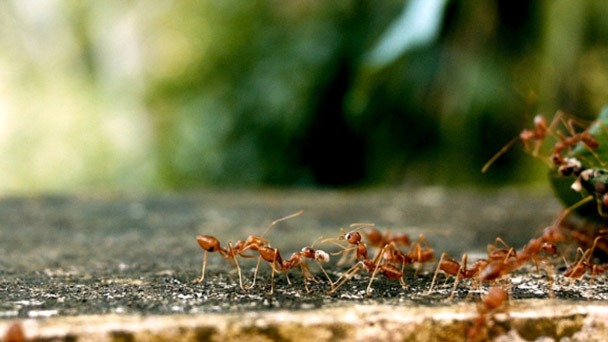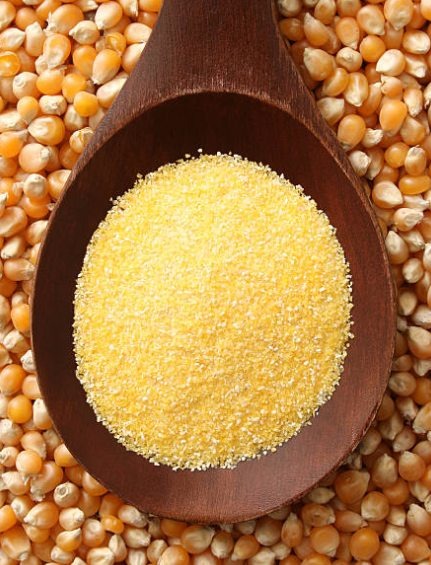Does Cornmeal Get Rid of Ants - How to Use It
Written by Ivy
Jan 30 2023

Ants are quick to venture indoors in search of food when their own resources are scarce. Depending on where you live and the type of home you own, you may have experienced one or more ant invasions over the summer.
Cornmeal, on its own, does NOT cause ants to explode. If you put out cornmeal, the ants will simply enjoy the meal you've provided for them.
So what should you do if you're unable to use conventional methods of ant prevention to address an ant problem? Luckily, there are a few natural methods to get rid of ants that are just as effective.
What Exactly is Cornmeal?
The term "cornmeal" refers to a unique variety of flour (or meal) made from dried and ground corn kernels. The cornmeal can be finely ground or coarsely ground, depending on the situation. It can also take the form of a powder with a variety of consistency.
For some of our favorite baked goods, like cornbread and corn muffins, cornmeal can be the main ingredient. It can also be consumed on its own. This kind of grain is a great source of phosphorus, iron, and dietary fiber.
Additionally, cornmeal is frequently mentioned as an excellent substitute for wheat flour in baked goods with either smooth or crunchy textures.
Is Cornmeal Ant Killer?
Will cornmeal kill ants? Nope, it wouldn't. It is capable of something else though – ants can't resist the taste of the flour.
Yes, using cornmeal alone would be the same as feeding an entire ant colony with snacks (which is kinda cool when you think about it).
Combining it with actual ant poison, on the other hand, might do the trick.
Why is the cornmeal ant trap the perfect preventive strike against a spreading colony of ants?
- Workers cannot eat hard food. They only drink notorious liquids. This means they will take every last flake of the flour into the nest where most of the food is given to larvae.
- In return, the larvae will consume poisonous cornmeal and convert it into liquid so the workers can enjoy a nice meal after a heavy day's work.
Boom, you've just eliminated an entire nest with nothing but "spiced" cornmeal. That's what I call strategic thinking!
How to Kill Ants With Cornmeal
The common claim that cornmeal kills ants according to internet lore is that ants enjoy eating it and will consume it if it is spread along their usual paths in your home or garden. Ants can't digest cornmeal, so when they drink water, it swells inside their digestive tracts and kills them.
Even though the theory doesn't seem implausible, it is something that could be easily demonstrated through scientific investigation. It is doubtful that this ant-control method will work given the paucity of scientific evidence in favor of it. However, by trying this, you won't put your children or pets in danger.
Cornmeal may work well when used as part of a baiting system, despite its possibly dubious effectiveness when used alone as an ant-killer. In ant baits, a pesticide is combined with a food that ants enjoy eating. The most effective way to control these insects is with ant baits. Before buying commercially prepared ant baits, you can first try the homemade cornmeal version to see if it will work with the specific ant species invading your home.

1. Mix the Cornmeal Bait
Insecticide such as boric acid or borax should be mixed with 9 parts cornmeal. Insecticides used as bait must be slow-acting to prevent the ant that discovers the bait from passing away before bringing it back to the nest. Add enough soybean oil to the mixture to turn it into a paste.
2. Put into a Container
Put the recycled yogurt or cottage cheese containers with punched entry holes on the lids into which the cornmeal bait will be placed. The containers should be left outside, away from areas where kids and animals congregate. It is poisonous if consumed and toxic if exposed repeatedly.
3. Remove Other Food Sources
Eliminate all other sources of food. Make sure there is nothing else for the ants to eat by doing a thorough cleaning of your home and yard. Eliminate other sources of water by fixing leaks in the pipes and faucets.
4. Monitor the Bait
Check to see if the ants are consuming the bait every few days. If the cornmeal/soybean oil doesn't appeal to them, try something sweet, like honey, or something greasy, like peanut butter. Different types of ants prefer different foods.
Why Use Cornmeal?
You must be thinking something along these lines to yourself: "Ok, but if I poison the nest, I win the war. It makes sense so far. Why do I have to use cornmeal though?"
You see, most poisons are sold in liquid form. Sure, you can use a bit of boric acid and will get rid of a couple of workers, but since your weapon is liquid, they'll happily eat the treat before heading back home.
Making a paste that combines a deadly venom and the food most ants love so much – now that is a diabolical trick to play on the unsuspecting insects.
Facts About Ants
Ants are omnivores. They live in a nest or a hill. The queen and larvae stay in the nest. The worker ants go out to find food.
Worker ants only eat liquids, so they bring whatever solid food they can find back to the nest for the queen and larvae to eat. After the other ants eat, they regurgitate the solid food into liquid form for the worker ants to eat.
This is why putting out solid food with poison is an effective way to poison an entire nest.
Other Ways to Get Rid of Ants
Once ants have made their way into your home, it's difficult to get rid of them. This guide can help you identify the type of ants you have in your home. This information can be helpful to bait and eradicate these pests.
Prevention
Obviously, it's best to not have an ant problem in the first place! Don't leave tasty treats to entice the ants into your home.
- Vacuum crumbs and food debris regularly.
- Keep counters and food preparation areas wiped and clean.
- Seal trash cans.
- Clean up any water leaks.
- Seal entry points into your home.
- Cover or remove rotten wood from outside your home. Ants love rotting wood!
- Vinegar
Vinegar will kill the ants if you spray it on them. Use vinegar to wipe down well-traveled ant paths.
Diatomaceous Earth
Diatomaceous Earth is diatoms or crushed fossilized water algae. The particles have microscopic jagged edges that can penetrate an insect's shell. Sprinkle it around entry points, or other areas where you observe ants.
Also Read How to Get Rid of the Following Species:
Animals:
- Brown Recluse Spiders
- Hornets
- Palmetto Bugs
- Spider Mites
- Water Bugs
- Black Caterpillars
- Grass Flies
- Carpenter Bees
- Beetles
- Scorpions
FAQs
Why Does Cornmeal Kill Ants?
It doesn't unless combined with actual ant poison. Otherwise, it is just food.
Will Cornmeal Kill Fire Ants?
Cornmeal alone will not kill any species of ants.
How to Kill Ants With Cornmeal?
You'll need to mix it into a paste with ant poison and scatter the mixture around the house.
Conclusion
The cornmeal myth is quite fun, though I am a bit sad that this 100% natural solution does not work in favor of the exterminator.
That being said, I have tried a couple of organic ant poisons in my life, and some of them showed promising results. For instance, you can combine corneal with vinegar or lemon acid for nice performance without any serious risks to creatures larger than an ant.
Have you, by any chance, heard any other peculiar insect-related stories you'd like me to fact-check or debunk? Feel free to share them with me. I am always on the lookout for more insights and experimentation.
Latest Updated
- How Do You Get Rid Of Possums - Possum Control Guide
- How To Use Vinegar to Get Rid of Armadillos Quickly
- Does Peppermint Oil Repel Spiders - Get Rid Of Spiders
- Does Cornmeal Get Rid of Ants - How to Use It
- How Do Exterminators Get Rid Of Mice In Walls - Is It Work?
- How To Control & Get Rid of Nutsedge
- How to Get Rid of Groundhogs Under House Effectively
- How To Get Rid of Ant Bites Overnight - Home Remedies
- How to Get Rid of Brown Recluse Spiders - 2023 Guide
- How To Get Rid of Hornets with Simple Steps
Popular Articles
- Winter maintenance of Antirrhinum Majus
- How to Grow Terminalia Mantaly Tree
- How to Grow and Care for Crossostephium Chinense
- How to grow Antirrhinum Majus in spring
- Peristeria Elata (Dove Orchid) Profile: Info & Care Guide
- Underwatered Snake Plant (Sansevieria Trifasciata) - Signs And How To Fix
- How to Care for Brazilian Jasmine Plant (Mandevilla Sanderi)
- How to Grow & Care for Graptopetalum Purple Delight in Summer
- Rosa Chinensis (China Rose): Plant Growing & Care Tips
- How to Care for Baby Sun Rose (Aptenia Cordifolia)